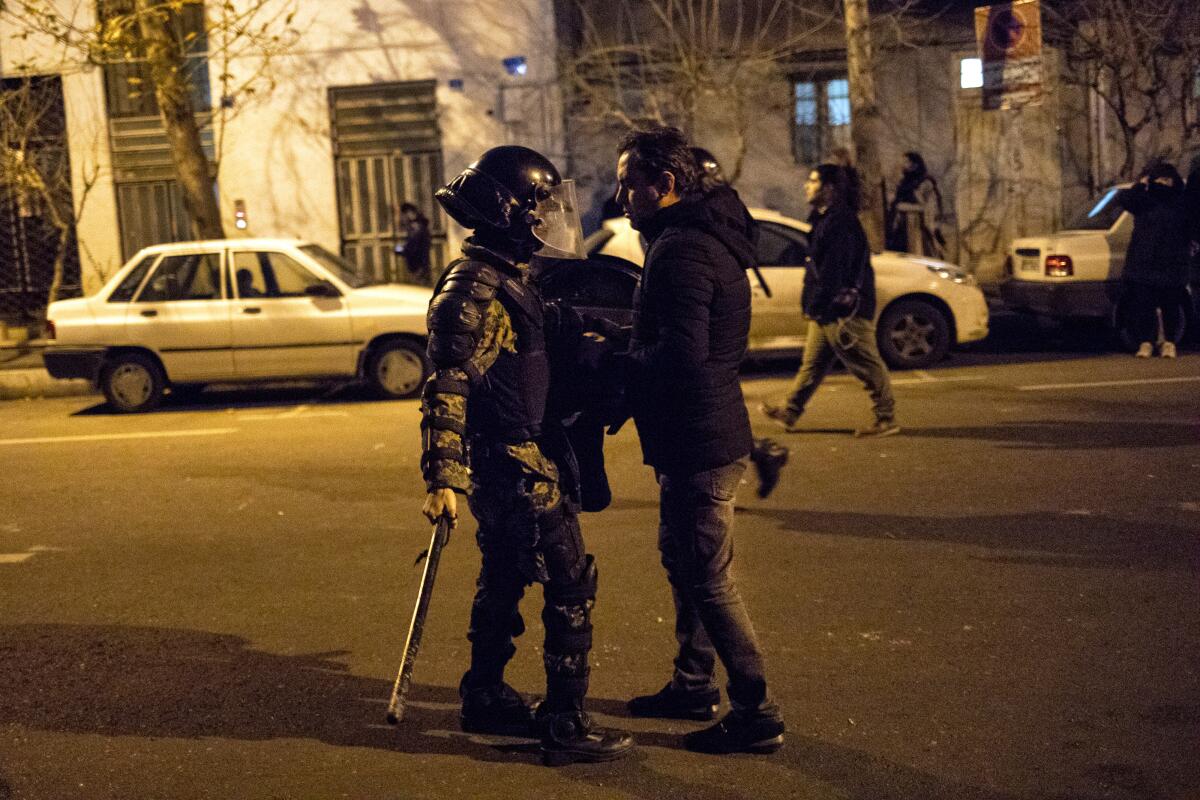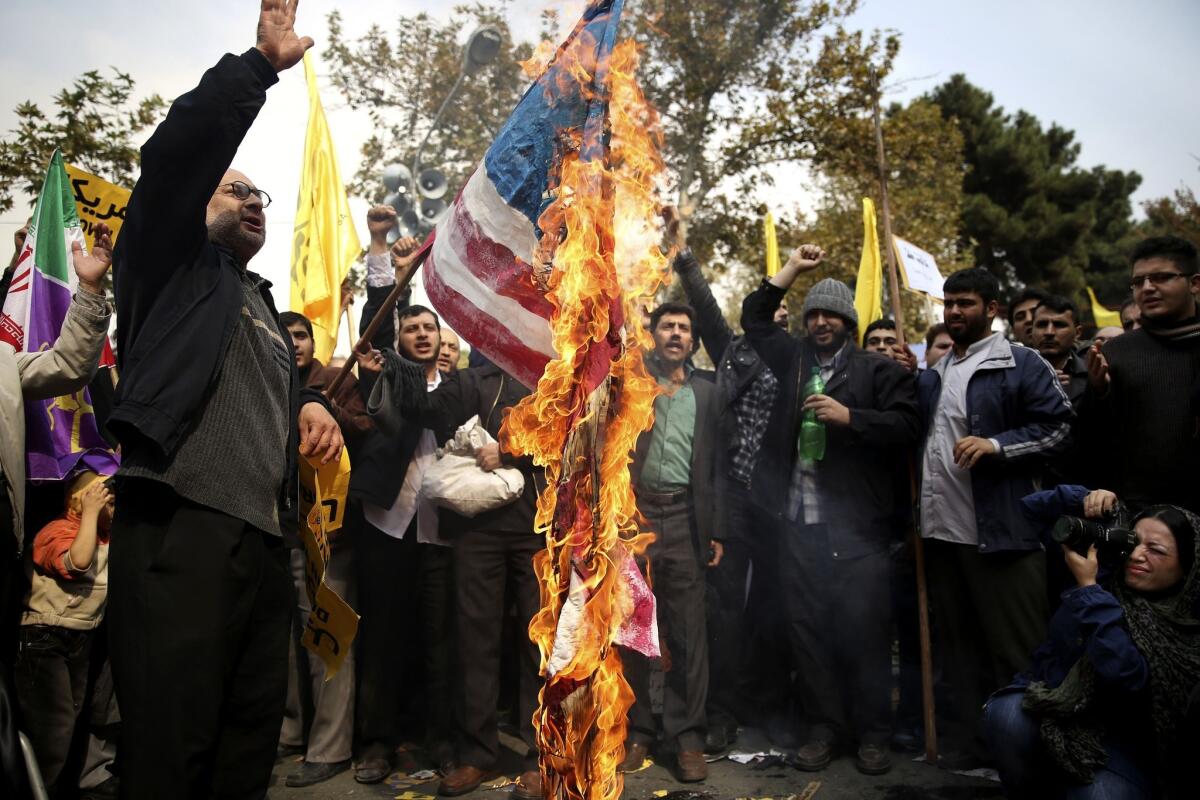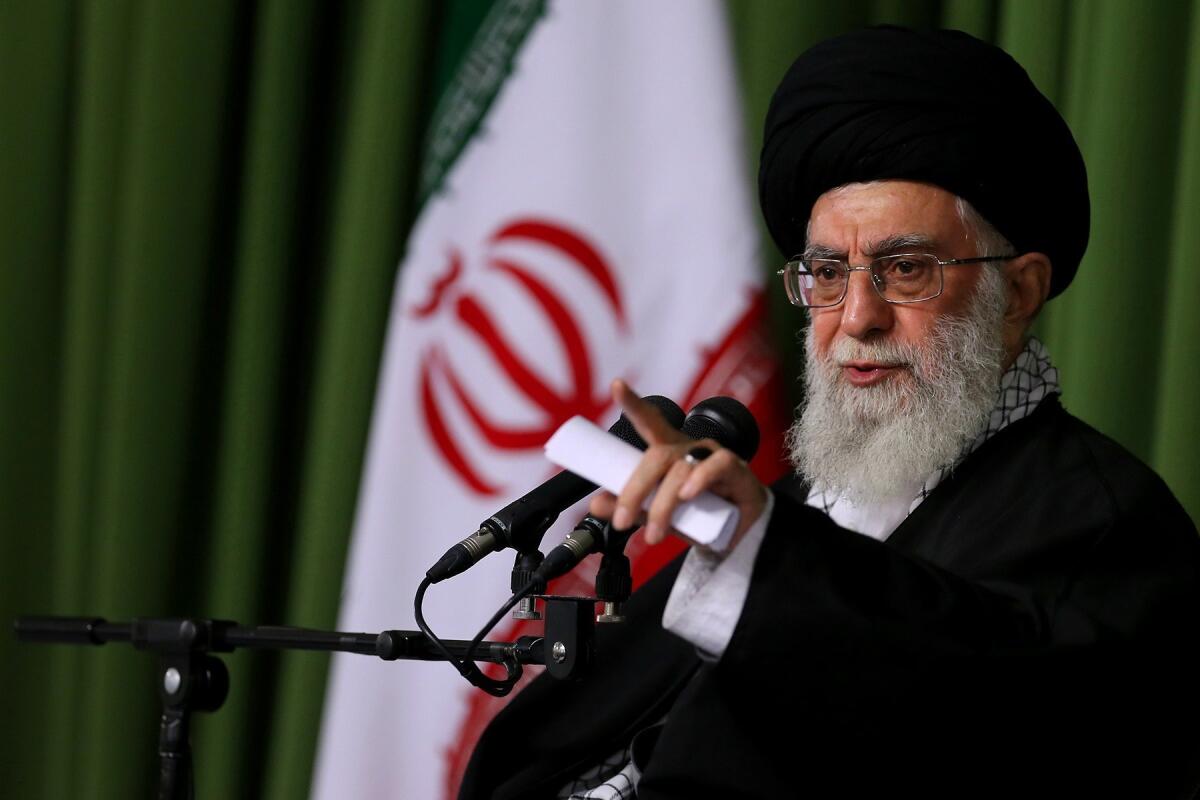This Iranian scarf seller has been beaten and humiliated. Yet he endures

- Share via
TEHRAN — The sun is out on a winter’s day.
A tiny scarf seller with olive skin and light brown eyes enters a Tehran bazaar. He wears old sports pants with ripped pockets. Police rush toward him. They drag and lift him; his feet dangle off the ground. They seize his scarves and disappear. He is battered and red with fury. His name is Abolfazl.
A man brings him tea.
“Drink this, you’ll feel better,” says the man.
“The police did not like your attitude,” another vendor tells Abolfazl.
“They hit my brother,” says Abolfazl, who, like his sibling, sells scarves illegally in the bazaar. “I took revenge.”
“The police are coming back to take our goods,” says another vendor. “We should run away.”
Breaths quicken.
“They can do their jobs, but we need to work,” says Abolfazl, 20. “It’s not right to treat us this way. We put our character underfoot by doing this kind of work. Yet they humiliate us in front of all people.”
The ruckus over, the bazaar, which dates to the Qajar dynasty, returns to its rhythms. The thrum of voices; the selling of spices and pots. Years of economic sanctions have frayed Iran. One has to dig deeper into a pocket to find a coin. People whisper about broken things and bills not paid. The police and Revolutionary Guards are everywhere. They arrive in swirls like flocks of dark birds. They put down protests, but the nation is angry, and even Supreme Leader Ayatollah Ali Khamenei, who was close to starting a war with the Americans this month, is reviled and ridiculed by many.
“Death to the Dictator!”
The words snap the air.
Not far from Abolfazl, near the gates of a university, Mohammad, a student protester, fidgets with his silver Armani watch. He keeps an eye out for the Basij paramilitary forces on motorcycles. They send text messages and tear through streets hunting dissidents. Mohammad is studying to be an engineer, which, if things don’t get better, may leave him with only a diploma. He wants to upend the government.
“We are reformists,” he says. “But we do not belong to any political parties. We demand our rights to improve our lives. We want self-determination and to benefit from the future.... If the regime admits to its mistakes, there would be a chance to reform from within. But if it doesn’t or wouldn’t, the change will occur.”
“It will have costs for sure, but we are prepared,” he says. “The issue is not about hope, the issue is resistance.”

It is like this in Iran. Rage and talk of politics; the unshaped designs of a new revolution. So many pressures roil the country from within and without. Parliamentary elections are coming in February. The young and moderate want change. Clerics and conservatives rouse followers with nationalism and God. Women in black chadors are angry that Foreign Minister Mohammad Javad Zarif has not taken a stiffer line with Washington after President Trump ordered the killing of Iranian Gen. Qassem Suleimani.
“We are fed up with your diplomatic smile,” the women chanted.
Europe, meanwhile, has threatened new sanctions over charges that Iran has further violated the 2015 nuclear deal. But people wonder: What’s left to sanction? The hard-liners, and the men who come to Friday prayers at the big mosque, shout death to the U.S. They burn American flags, which, like flags from Britain and Israel, are made in a factory outside Tehran. In times of nationalist zeal, flags of enemies are torched and stomped on. The TV cameras come. But it does little good for men such as Abolfazl, who, like many illicit vendors, has, despite his ragged clothes, retained a degree of pride.
“I have worked since I was 9,” says Abolfazl, who sells between 60 and 80 scarves a day, earning about 25 cents on each one. “I pay my university expenses. I am not afraid of anything. My slogan is: ‘If you fall on the ground, you should stand up again.’ My situation is not suitable, but I never feel sad. I keep myself happy. I am motivated.”
One wonders. Abolfazl studies physiology at university. He’s a midfielder for a 2nd Division soccer team. He makes no money playing, so, like his brother, he peddles wares, like a man from ancient times. His father is a construction laborer. But when gas prices shot up as much as 50% in November, there were fewer rials for everybody to spend.
“Prices are getting higher and people do not have comfortable lives,” he says. “The problem is sanctions. We are against the U.S. because they imposed sanctions on us. They want to force us to follow the wrong path to make peace with them. Then come in and take control. What can I say? They are deceivers.”

Abolfazl is conservative. He supported former President Mahmoud Ahmadinejad, who railed against gays and threatened to wipe Israel off the map. He was popular in the provinces. Abolfazl does not support President Hassan Rouhani, a moderate caught between appeasing the ruling clerics and the security forces that in effect run the country while trying to meet the endless demands for social freedom from the young.
“I think that Rouhani may not know about me and people like me,” says Abolfazl. “We follow our leader [Khamenei], our revolution. I am a regime supporter. I will take part if the war happens.”
There is a sense that war might come. No one knows. There has been talk for years. The bazaar fills. Voices from the crowd echo against stone, through streets and into the sky. Abolfazl must collect himself; he needs new scarves to sell. He is unmarried and would like a wife, but he has little to offer, a man shrunk by circumstance in a nation that through most of his life has endured more than it has thrived.
When he’s not hawking scarves, or attending university classes, he guards and cleans a soccer field. He rents a room nearby for the equivalent of $57 a month. “The roof leaks,” he says, “but I cover it with plastic and it stops.”
More to Read
Sign up for Essential California
The most important California stories and recommendations in your inbox every morning.
You may occasionally receive promotional content from the Los Angeles Times.










